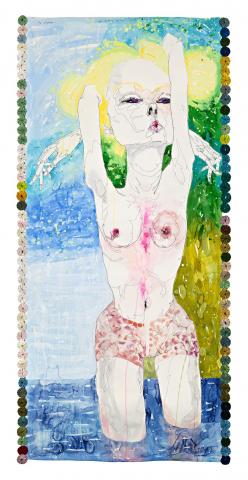TO ANYMORE ..., 2008-09
DEL KATHRYN BARTON
watercolour, gouache, ink and silk with embroidery thread on paper
255.0 x 122.0 cm
signed and dated upper centre: del kathryn barton 2008 - 2009
titled upper left: to anymore ...
Karen Woodbury Gallery, Melbourne (label attached verso)
Private collection, Melbourne
Figuration Now, Karen Woodbury Gallery, Melbourne, 11 February – 7 March 2009
'I have a sense that the biggest secrets of the universe are "discoverable" within our own bodies.'1
The figure signifies all in the work of Del Kathryn Barton. In To Anymore ... 2008-09 its predominance is unequivocal not only because the girl/woman emerging from the watery depths takes up much of the picture plane but also due to the colossal scale of the work itself. The amplification of the truncated torso is confronting, to say the least. Barton comments on the critical role of scale in her work stating, 'When I stand in front of a painting I want to have this palpable and physiological moment with it. For me, that's at its most heightened when the canvas encompasses natural proportions to my body.'2 Furthermore the scale of the work allows the artist to powerfully invoke her fascination with a crooked form of beauty and womanhood where the female form is both erotic and repelling simultaneously. This blond and somewhat ragged marine Venus appears as though she is being born fully formed before our eyes, uncurling from the water into the atmosphere above still bloodied from the process, her eyes, lips and breasts stained with red ink.
Decoration and embellishment are also central to Barton's vision. The female form in To Anymore ... is more naked than most, her body sparingly decorated with skin-tight translucent shorts. Prettiness and other notions of femininity are subverted and her solitude and singularity seems impregnable. What makes this work all the more poignant is a sense that the woman is being painted and created before our eyes, handmade by the artist herself, as though she is being drawn into life. As Anthony Gardner concludes, her works are both swamped by the all-embracing lines and dots, and emerge defiantly from that world, taking from the ground like a figure appearing from shadow. They are both becoming...and potentially 'unbecoming': becoming a form, and yet losing their figurative markers; becoming a female figure through, despite and because of the energies of the world around them; and yet slipping back into the pulsating ground from which they come; becoming a singular body through the contingent processes of lines becoming dots becoming skin becoming breasts.'3 The lines of hand-made silk rosettes framing the work bring emphasise to the creation process and draw out yet another contradiction between 'the gentle arts' of handwork, the traditional domain of the domesticated woman, and the raw woman before us in To Anymore ...
1. Barton, D., quoted in Craven, O., 'Del Kathryn Barton', Artist Profile, issue 15, 2011, p. 55
2. Craven, O., op. cit., p. 57
3. Gardner, A., 'Del Kathryn Barton - A Paradox of Ecstasies', Art and Australia, Autumn 2008, vol. 45, issue 3, p. 433
LARA NICHOLLS
